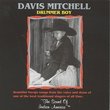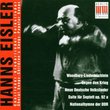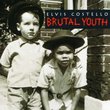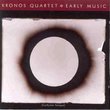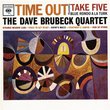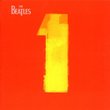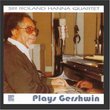| All Artists: Ludwig van Beethoven, Herbert von Karajan, Berlin Philharmonic Orchestra Title: Beethoven: Symphony No. 9 "Choral" Members Wishing: 0 Total Copies: 2 Label: Deutsche Grammophon Release Date: 10/25/1990 Genre: Classical Styles: Historical Periods, Classical (c.1770-1830), Modern, 20th, & 21st Century, Symphonies Number of Discs: 1 SwapaCD Credits: 1 UPC: 028941583222 |
Search - Ludwig van Beethoven, Herbert von Karajan, Berlin Philharmonic Orchestra :: Beethoven: Symphony No. 9 "Choral"
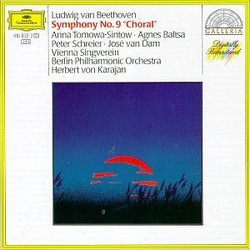 | Ludwig van Beethoven, Herbert von Karajan, Berlin Philharmonic Orchestra Beethoven: Symphony No. 9 "Choral" Genre: Classical
This is the second of Herbert von Karajan's three versions of this symphony for Deutsche Grammophon, and it's a very nice one. Karajan always did well by the orchestral portions of this symphony, playing them sort of lik... more » ![header=[] body=[This CD is available to be requested as disc only.]](/images/attributes/disc.png?v=a4e11020) ![header=[] body=[This CD is available to be requested with the disc and back insert.]](/images/attributes/disc_back.png?v=a4e11020) ![header=[] body=[This CD is available to be requested with the disc and front insert.]](/images/attributes/disc_front.png?v=a4e11020) ![header=[] body=[This CD is available to be requested with the disc, front and back inserts.]](/images/attributes/disc_front_back.png?v=a4e11020) |
Larger Image |
CD DetailsSynopsis
Amazon.com This is the second of Herbert von Karajan's three versions of this symphony for Deutsche Grammophon, and it's a very nice one. Karajan always did well by the orchestral portions of this symphony, playing them sort of like proto-Bruckner. In the finale, as in his 1963 recording, he seems to prefer a very light, backward-balanced choral sound that will not appeal to those who believe that Beethoven meant the words to be heard. That reservation aside, this performance can be recommended as typical of Karajan and the Berlin Philharmonic Orchestra in top form. --David Hurwitz Similar CDs
Similarly Requested CDs
|
CD ReviewsGreat Ninth , but get the New (2003) transfer R. Lane | Tracy, CA USA | 05/22/2003 (5 out of 5 stars) "Universal / DG have just released a 2 CD set containing this famous performance coupled with the 5th and 6th symphonies from the same integral cycle , catalog number 474260-2. The Amazon ASIN # is B00008CLNP. The recording has been remastered at 96kHz with 24bit digital recorders. And it is worth a few extra $ ... just for the newer transfer of the Ninth. The balances are much more realistic and make for an incredible listening experience. I've known this recording for over 20 years. I've always had a slight dislike for the close microphone techniques of DG in the 70s, and this is a typical recording from that era. Too many close microphoned highlights of individual instruments or orchestra sections for brief moments. Well, I feel like I've discovered a new recording. Gone are the over dominating percussion moments, and the sound of violins being plucked is much more pleasant, especially bass violins. And the individual voices and parts of the chorus are much more distinguishable than in this Galleria copy. Just listen to the 3rd movement on both issues and you'll never want to hear the Galleria copy again." Karajan's Best Ninth John Buie | United States | 03/06/2000 (5 out of 5 stars) "Karajan's 1977 account of Beethoven's Ninth Symphony is, in my humble opinion, the best stereo version of this masterpiece on record. It is far superior to Karajan's later digital version and even beats out his earlier 1962 account. One of the reasons for its superiority is the magnificent Adagio, which Karajan slows down (as compared to his earlier effort) to emphasize its glowing tranquility. The playing of the Berlin Philharmonic is magnificent throughout and the vocal quartet is likewise excellent. Special recognition should go to Jose van Dam, who gives one of the finest performances I have heard. I personally have several versions of this work in my collection. This one is my favorite. Highly recommended!" Certainly one of the best stereo Ninths J. Luis Juarez Echenique | Mexico City | 04/30/2000 (5 out of 5 stars) "When Karajan developed "his" sound from the BPO, it was obvious that it would suit some composers better than others. That gorgeous velvet sound proved ideal for Strauss and Bruckner, but Mozart and Haydn suffered and to some degree so did Beethoven, who needs clearer sharper lines. But the Ninth is perhaps the one Beethoven symphony who can take the Karajan sound without loss of clarity. I always thought this is one of the finest Beethoven symphonies recorded by Karajan, big boned but spiritual, with a drop-dead gorgeous vocal quartet, the finest ever perhaps. This is certainly a better recording than the 1963 version, and far better than the 1984 digital remake when he was at odds with BPO over Sabine Meyer, sad years for Karajan and his great orchestra. This is one of the Ninths to be had."
|

 Track Listings (5) - Disc #1
Track Listings (5) - Disc #1
